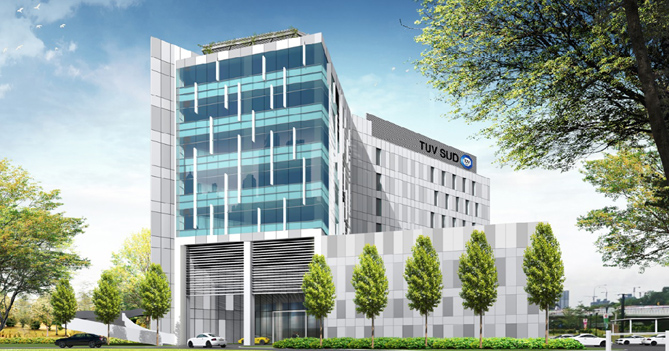TÜV SÜD uses digital twin to design Singapore HQ
- February 8, 2021
- Steve Rogerson

European test and certification house TÜV SÜD used digital-twin smart building technology to design its new Singapore offices where around 700 employees will work from this year onwards.
The test house used Belgian firm Spacewell Axxerion software to design the eight-story, 18,900m2 smart building.
Axxerion SaaS provides best-practice workflow automation for property and facilities management, offering the flexibility to tailor workflows to requirements. The software also connects with the IoT using real-time data to drive building performance and optimise the occupant experience.
“When planning our new Singapore headquarters, we decided right from the outset to design a digital twin,” said Joachim Birnthaler, CEO of TÜV SÜD’s real estate and infrastructure division. “This enabled us to benefit from simulations in the design phase and digital testing during construction. Spacewell’s Axxerion software is now supporting us in making a smooth transition as we can continue to use our digital twin to ensure efficient operation of our building.”
But the implementation of the Axxerion software at IBP15 is just the first step in a partnership between TÜV SÜD and Nemetschek’s brand Spacewell, focusing on smarter asset management and practice-driven digital twin implementation aimed at enabling high-efficiency operation of self-regulating, fully autonomous buildings.
“We are delighted that TÜV SÜD has decided to use our Axxerion software in its IBP15 building,” said Koen Matthijs, chief division officer at Nemetschek. “Our companies have a like-minded approach to the digital transformation of building life-cycle management, and we look forward to sharing our experiences in this field.”
Founded in 1866 as a steam boiler inspection association, TÜV SÜD has evolved into an expert for testing, inspection and certification. More than 25,000 employees work at over 1000 locations in about 50 countries to improve technology, systems and expertise. They contribute to making technical innovations such as Industry 4.0, autonomous driving and smart buildings and infrastructures safe and reliable.

